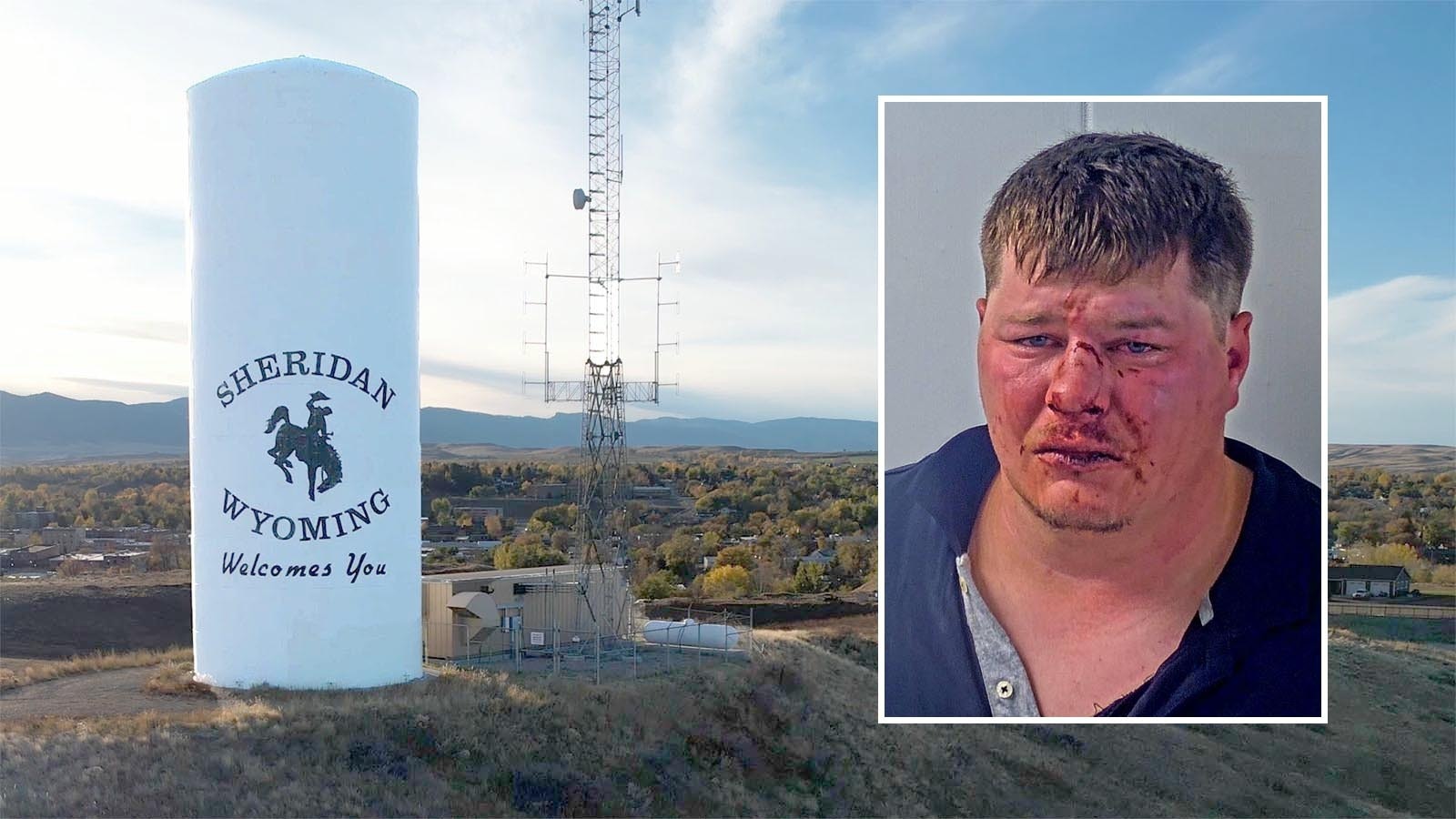The 41-year-old Wyoming Highway Patrol trooper now serving 10-15 years in prison for raping his then-girlfriend in 2021 does not get a new trial, the Wyoming Supreme Court ruled Friday.
Gabriel Lee Testerman’s claims that his case prosecutor and judge let his ex-girlfriend ramble about his character flaws before a jury were not enough to overcome his guilty verdict for first-degree sexual assault, the high court decided.
A Laramie County district court judge sentenced Testerman last May to 10-15 years in prison after a jury convicted him Feb. 1, 2024, of first-degree sexual assault for forcibly raping his ex-girlfriend three years earlier.
The jury opted not to convict Testerman on two more charges tied to claims he sexually assaulted another woman during a one-night stand in 2022.
The Dirt
On appeal, Testerman argued to the Wyoming Supreme Court that his ex-girlfriend’s testimony meandered and maligned his character before the jury.
Specifically, she said he’d discussed sexual themes in front of her children, he’d been part of a swingers club, he may have photographed her during sex against her wishes, he’d disclosed to her a past sexual trauma he’d suffered. He also said he kept “dirt on others,” he’d been married four times, hadn’t treated women well and that his daughter had said she wanted to go home to her mother rather than stay with him.
Testerman also argued that the case prosecutor had “vouched” for the victim and other alleged victim’s believability, and that the alleged victim had been allowed to insinuate that he drove home drunk during their one-night stand.
Not only were each of these alleged errors ultimately harmless on their own, they didn’t accumulate to render the trial unfair, the Wyoming Supreme Court ruled in a unanimous majority opinion written by Justice Robert Jarosh.
Neither the judge nor prosecutor violated his role, the opinion adds.
The Things She Said
On April 25, 2022, a woman drank with Testerman and went home with him. There, she took one or two sips from a drink he made her, then became dizzy and “perhaps blacked out,” according to her testimony.
She told the jury during Testerman’s trial that she woke later to him sexually assaulting her.
She gathered her belongings, left the home and reported the incident four days later.
Cheyenne Police Department Detective Nick Morgan reached out to Testerman’s former girlfriend during the investigation.
The ex-girlfriend said that in July 2021 while living with Testerman, she woke to find he’d forced her legs apart with a “spreader bar” and was raping her.
The ex-girlfriend told the jury that she didn’t report the incident before being contacted by Morgan because she worried about humiliating her children, she feared Testerman’s influence in his law enforcement role and because he’d indicated he kept “dirt on people,” the opinion notes.
Their Relationship
Testerman told his girlfriend of 2021 that he had been married four times and hadn’t treated women very well in the past, and that he’d suffered a past sexual trauma, according to her testimony.
The relationship fizzled that summer when Testerman had sexually-charged conversations in front of the girlfriend’s kids, she testified. Because he’d blindfold her during sex, she often worried he was photographing her, which was a “hard no” for her, she added.
The rape happened July 31, 2021, after the pair attended a Cheyenne Frontier Days concert.
The girlfriend moved out one month later.
Around that time Testerman’s daughter kept saying she wanted to go home, and he wouldn’t let her go home, the girlfriend had testified.
About That ‘Narrative’
The high court scrutinized whether some of the girlfriend’s claims simply made him look like a bad person and threw his trial.
They did not, Jarosh concluded in the order.
Those were Testerman’s reported statement he’d suffered a past sexual trauma, the ex-girlfriend’s claim he’d had sexualized conversations in front of the children, and the ex-girlfriend’s comment about his daughter.
As for the claims about Testerman’s daughter wanting to go home and Testerman having sexualized conversations in front of the children, that was a case of the witness meandering off the topic of the question the prosecutor asked her, the order says.
But in both cases, the judge stopped the woman from continuing with those stories once she strayed off topic. Also, these claims weren’t the type that can prop up a rape claim, the order adds.
“Mr. Testerman makes no cogent argument on appeal that the admission of these statements violated any clear and unequivocal rule of law,” Jarosh wrote. “It did not.”
As for Testerman reportedly saying he suffered past sexual trauma, that wasn’t a case of a prosecutor trying to make him look bad by pointing out past wrongs.
“It is quite the opposite,” wrote Jarosh.
But That’s Why
The chatter about Testerman “keeping dirt” on others, about his ex-girlfriend’s worries of being photographed, about him and a past wife having been “swingers,” about him treating women badly, and about him driving after drinking didn’t throw his trial either, the high court wrote — even though the state conceded on appeal that those claims painted a picture of him that went beyond the pre-approved trial evidence.
Testerman didn’t object at trial to his ex-girlfriend talking about her fears of being photographed. In fact, he used her statements to challenge her truthfulness by getting her to admit during cross-examination that the investigation didn’t reveal any photographs or videos of her.
As to the claim he kept “dirt on everyone,” the prosecutor didn’t elicit that testimony or bring it up in his closing statement, and he used that evidence to explain to the jury why she didn’t report the incident until approached by a detective. That didn’t seem to sway the verdict, Jarosh wrote.
The Swinger
Testerman had argued that his ex-girlfriend rambling about his past “swinger” habits was an attempt to splay his “unconventional sexual fetishes” to the jury.
But Testerman’s swinger tendencies had already been deemed fair game at a pre-trial hearing, and Testerman hadn’t argued that it was unfair evidence, the order says, adding that Testerman also testified about “partner swapping” at trial.
The implication in the order is that, if Testerman had thought evidence of his swinger ways would sway his trial, he would have argued that it was unfair when he had the chance and not told the jury about it in his own words.
Similarly, Testerman had also testified that he’d been married four times.
His ex-girlfriend had announced at trial that he’d mentioned he treated women poorly in the past, but when the judge told her to stay on topic, she didn’t elaborate.
The woman with whom Testerman had had a one-night stand testified that he’d driven home after drinking.
That might be a “prior bad act” of the kind for which a prosecutor needs pre-approval to expose at trial, but it’s not a consequential enough bad act to sway the verdict on a first-degree sexual assault charge, the order says.
Again, Testerman had testified of it himself as well.
Not Because Of #MeToo
During the rebuttal phase of his closing statement the prosecutor, Sweetwater County Attorney Danny Erramouspe, urged the jury to believe the women’s account in the he-said-she-said case.
“He’s got a dark side, and these women experienced it,” said Erramouspe. “They opened the bedroom door for you , and they showed you what was going on. And because they do that, I’m going to ask you real simple. Believe them. Just believe them. Not because they’re women. Not because of hashtag MeToo. Not because of anything else, but because they’re believable.”
Testerman didn’t object to any portion of that rebuttal.
He argued on appeal that Erramouspe had committed prosecutorial misconduct by “vouching” for the witnesses.
He also argued Erramouspe had vouched for Morgan by saying the detective was “honest, and spilled the beans.”
The high court disagreed, saying the whole context gives a fuller picture.
Erramouspe referenced the detective spilling the “beans” to note how the detective had been forthcoming about missteps in his own investigation. This wasn’t a case of the prosecutor personally vouching for the detective’s character, the high court added.
When speaking of the women, the prosecutor noted how intimate were the details they had to divulge while answering questions on the stand. This was a comment on the evidence’s credibility, not a personal vouching for the women’s character, Jarosh’s order says.
Lastly, the order says, these little alleged errors don’t add up to a mess capable of compromising the whole trial.
“The testimony can be best understood as background related to either Mr. Testerman’s relationship with (his ex-girlfriend) or, in the case of drinking and driving, the events leading up to the (second alleged rape).”
These statements, largely unelicited meanderings by Testerman’s ex-girlfriend, were generally unrelated to each other and not directly tied to the crime of rape, Jarosh added.
Clair McFarland can be reached at clair@cowboystatedaily.com.





